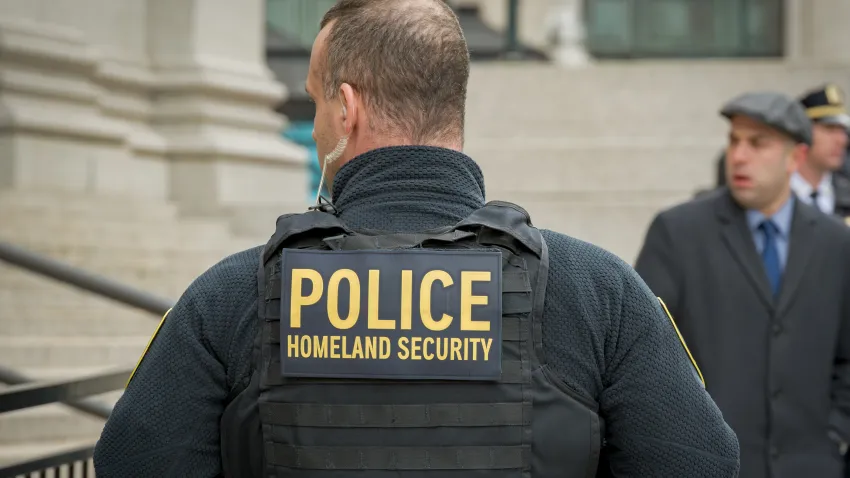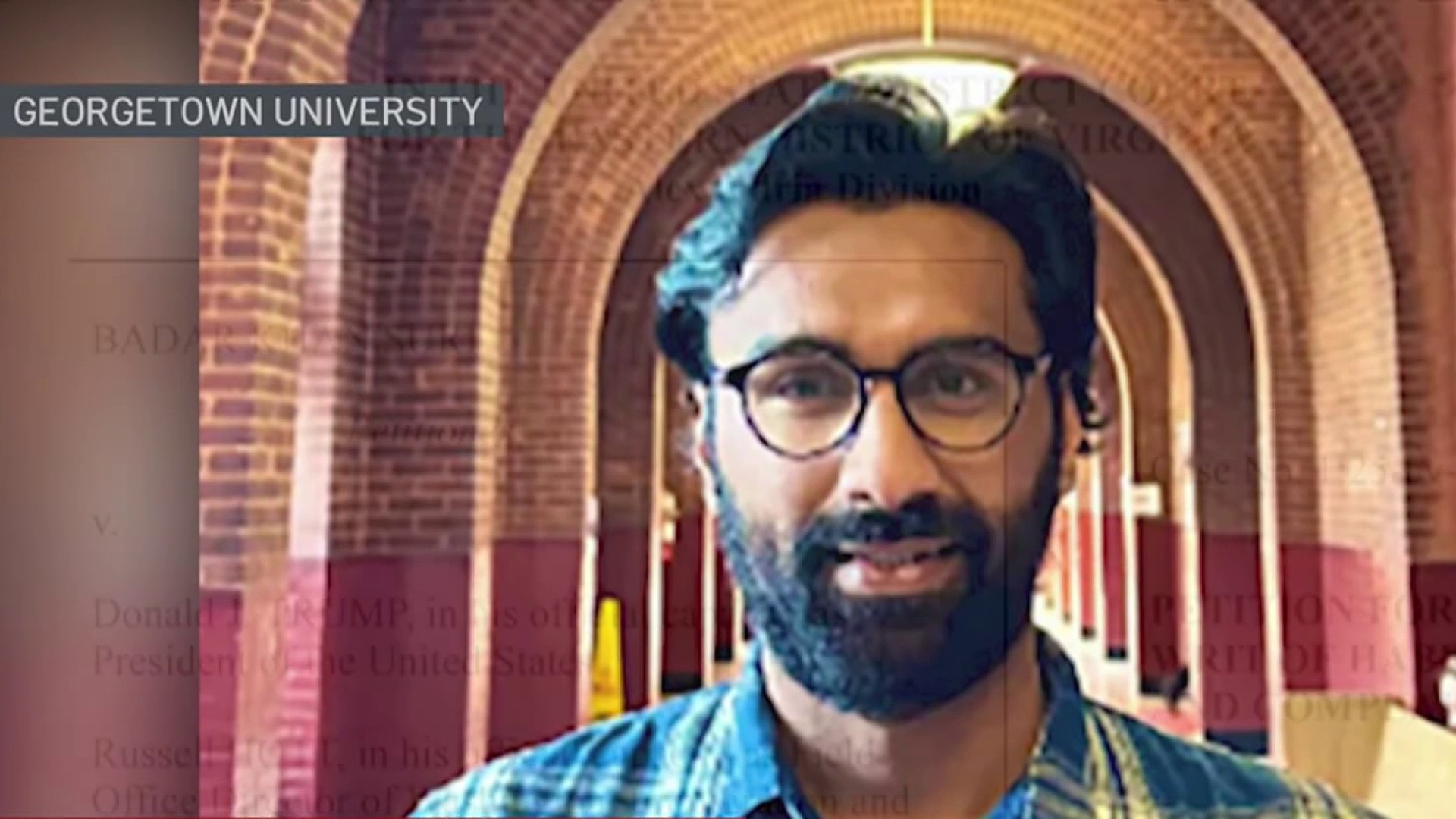Lucas Sielaff spent 16 days locked up at the Otay Mesa Detention facility south of San Diego before being allowed to fly home to Germany, reports NBC 7’s Omari Fleming.
European countries and Canada are updating their advisories for travelers to the United States after several tourists were detained at the border.
Germany added a message last week that a visa may not guarantee entry into the country, according to Reuters. This comes after at least two German tourists have been held in detention centers at the U.S.-Mexico border, including Lucas Sielaff who was stuck in the Otay Mesa Detention Facility south of San Diego for several weeks.
German tourist recalls being held in ICE custody
Lucas Sielaff and his U.S. citizen fiancé, Lennon Tyler, were stopped at the Tijuana border crossing last month.
Get top local stories in San Diego delivered to you every morning. Sign up for NBC San Diego's News Headlines newsletter.
U.S. border agents handcuffed Tyler, a U.S. citizen who lives in Las Vegas, and chained her to a bench, while her fiancé was accused of violating the rules of his 90-day U.S. tourist permit, the couple said. Authorities later handcuffed and shackled Sielaff and sent him to a crowded U.S. immigration detention center. He spent 16 days locked up before being allowed to fly home to Germany.
"It was horrible. You are just innocent and want to go to America and then they put you in jail and they asking you questions and you don't even know what to say," Sielaff told NBC 7 from his home in Germany.
Sielaff was allowed into the United States under a waiver program offered to a select group of countries, mostly in Europe and Asia, whose citizens are allowed to travel to the U.S. for business or leisure for up to 90 days without getting a visa in advance. Applicants register online with the Electronic System for Travel Authorization.
But even if they are authorized to travel under that system, they can still be barred from entering the country.
Sielaff arrived in the U.S. on Jan. 27. He and Tyler decided to go to Tijuana for four days in mid-February because Tyler's dog needed surgery and veterinary services are cheaper there. They figured they would enjoy some tacos and make a fun trip out of it.
“Mexico is a wonderful and beautiful country that Lucas and I love to visit,” Tyler said.
They returned Feb. 18, just 22 days into Sielaff's 90-day tourist permit.
When they pulled up to the crossing, the U.S. border agent asked Sielaff aggressively, “Where are you going? Where do you live?” Tyler said.
“English is not Lucas' first language and so he said, ‘We’re going to Las Vegas,' and the agent says, ’Oh, we caught you. You live in Las Vegas. You can't do that,'" Tyler said, recounting what happened.
Sielaff was taken away for more questioning.
"They looked and saw and asked me all the questions I had to answer and then they put us to a secondary questioning and I had to answer more questions and I didn't even know what they want from me," he told NBC 7.
Tyler said she asked to go with him or if he could get a translator and was told to be quiet, then taken out of her car and handcuffed and chained to a bench. Her dog, recovering from surgery, was left in the car.
After four hours, Tyler was allowed to leave but said she was given no information about her fiancé’s whereabouts.
During questioning, Sielaff said he told authorities he never lived in the U.S. and had no criminal history. He said he was given a full-body search and ordered to hand over his cellphone and belongings. He was put in a holding cell where he slept on a bench for two days before being transferred to the Otay Mesa Detention Center in San Diego.
There, he said, he shared a cell with eight others.
“You are angry, you are sad, you don’t know when you can get out,” Sielaff said. “You just don’t get any answers from anybody.”
He was finally told to get a direct flight to Germany and submit a confirmation number. In a frantic call from Sielaff, Tyler bought it for $2,744. He flew back March 5.
Tourists held in ICE facilities
Since President Donald Trump took office, there have been other high-profile incidents of tourists like Sielaff being stopped at U.S. border crossings and held for weeks at U.S. immigration detention facilities before being allowed to fly home at their own expense.
They include another German tourist who was stopped at the Tijuana crossing on Jan. 25. Jessica Brösche spent over six weeks locked up, including over a week in solitary confinement, a friend said.
On Feb. 26, a tourist from Wales, Becky Burke, a backpacker on a trip across North America, was stopped at the U.S.-Canada border and held for nearly three weeks at a detention facility in Washington state, her father, Paul Burke, posted on Facebook. She returned home Tuesday.
On March 3, Canadian Jasmine Mooney, an actress and entrepreneur who had a visa to work in the U.S., was detained at the Tijuana crossing. She was released Saturday, her friend Brittany Kors said.

U.S. authorities did not respond to a request from The Associated Press for figures on how many tourists have been held at detention facilities or explain why they weren't simply denied entry.
Sielaff, 25, and the others say it was never made clear why they were taken into custody even after they offered to go home voluntarily.
“What happened at the border was just blatant abuse of the Border Patrol’s power,” Tyler said.
Ashley Paschen agrees. She said she learned about Brösche from a TikTok video asking anyone in the San Diego area for help after her family learned she was being held at the Otay Mesa Detention Center. Paschen visited her several times and told her people were working to get her out. Brosche flew home March 11.
“She’s happy to be home,” Paschen said. “She seems very relieved if anything but she’s not coming back here anytime soon.”
Immigration and Customs Enforcement said in an email to the AP that Sielaff and Brösche, who was held for 45 days, “were deemed inadmissible” by Customs and Border Protection. That agency said it cannot discuss specifics but “if statutes or visa terms are violated, travelers may be subject to detention and removal." The agencies did not comment on the other cases.
Border incidents fuel anxiety among foreign travelers to U.S.
The incidents are fueling anxiety as the Trump administration prepares for a ban on travelers from some countries. Noting the “evolving” federal travel policies, the University of California, Los Angeles sent a notice this week urging its foreign-born students and staff to consider the risks of non-essential travel for spring break, warning “re-entry requirements may change while you are away, impacting your return.”
Pedro Rios, director of the American Friends Service Committee, a nonprofit that aids migrants, said in the 22 years he has worked on the border he has never seen travelers from Western Europe and Canada, longtime U.S. allies, locked up like this.
“It’s definitely unusual with these cases so close together, and the rationale for detaining these people doesn’t make sense,” he said. “It doesn’t justify the abhorrent treatment and conditions” they endured.
“The only reason I see is there is a much more fervent anti-immigrant atmosphere," Rios said.

Before Mooney's release, British Columbia Premier David Eby expressed concern, saying, “It certainly reinforces anxiety that many British Columbians have, and many Canadians have, about our relationship with the U.S. right now, and the unpredictability of this administration and its actions."
The detentions come amid legal fights over the Trump administration's arrests and deportations of other foreigners with valid visas and green card holders, including a Palestinian activist who helped organize campus protests of the war in Gaza.
Tyler plans to sue the U.S. government.
Sielaff said he and Tyler are now rethinking plans to hold their wedding in Las Vegas. He suffers nightmares and is considering therapy to cope with the trauma.
“Nobody is safe there anymore to come to America as a tourist,” he said.
___
Associated Press writer Rob Gillies reported from Toronto.



